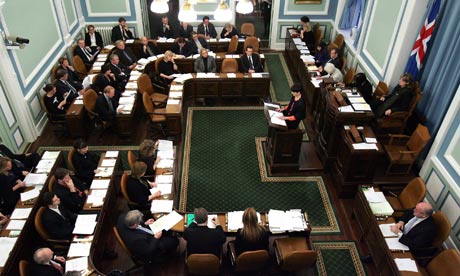Iceland crowdsources its next constitution
Country recovering from collapse of its banks and government is using social media to get citizens to share their ideas

The new constitution will include checks and responsibilities for Iceland's parliament (the althing). Photograph: Brynjar Gauti/AP
It is not the way the scribes of yore would have done it but Iceland is tearing up the rulebook by drawing up its new constitution through crowdsourcing.
As the country recovers from the financial crisis that saw the collapse of its banks and government, it is using social media to get its citizens to share their ideas as to what the new document should contain.
"I believe this is the first time a constitution is being drafted basically on the internet," said Thorvaldur Gylfason, member of Iceland's constitutional council.
"The public sees the constitution come into being before their eyes … This is very different from old times where constitution makers sometimes found it better to find themselves a remote spot out of sight, out of touch."
Iceland's existing constitution dates back to when it gained independence from Denmark in 1944. It simply took the Danish constitution and made a few minor adjustments, such as substituting the word "president" for "king".
In creating the new document, the council has been posting draft clauses on its website every week since the project launched in April. The public can comment underneath or join a discussion on the council's Facebook page.
The council also has a Twitter account, a YouTube page where interviews with its members are regularly posted, and a Flickr account containing pictures of the 25 members at work, all intended to maximise interaction with citizens.
Meetings of the council are open to the public and streamed live on to the website and Facebook page. The latter has more than 1,300 likes in a country of 320,000 people.
The crowdsourcing follows a national forum last year where 950 randomly selected people spent a day discussing the constitution. If the committee has its way the draft bill, due to be ready at the end of July, will be put to a referendum without any changes imposed by parliament – so it will genuinely be a document by the people, for the people.
Given that it was intended to go to a referendum, Gylfason said, the idea was that the public should be involved from the start of the process and not just at the end. Social media is seen as a way of making that happen with Iceland's population among the world's most computer-literate. Two-thirds of its people are on Facebook.
Gylfason said he had been pleasantly surprised by the level of discussion. "There's been a lot of goodwill for what we are trying to do. The public have added much to our debate. Their comments have been quite helpful and they have had a positive effect on the outcome."
Gylfason, an economics professor at the University of Iceland, said the draft bill would include checks and responsibilities for parliament and provisions for separation of powers intended to prevent a repeat of the financial crisis. It would also contain significant changes in the way MPs are elected and judges appointed.
http://www.guardian.co.uk/world/2011/jun/09/iceland-crowdsourcing-constitution-facebook


0 Response to "Iceland crowdsources its next constitution"
Post a Comment